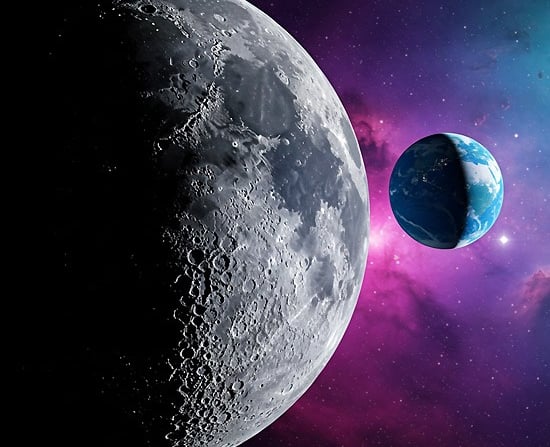What if the Moon Suddenly Vanished: A World Unmoored
Earth's Silent Guardian: The Indispensable Moon
The Moon, a familiar and seemingly constant presence in our night sky, is often perceived as a silent observer of Earth. However, this celestial companion, despite its distance, exerts a profound and multifaceted influence on our planet and the life it harbors. Should this luminous orb suddenly disappear, the consequences would extend far beyond a darker night, fundamentally reshaping the world as we know it.


One of the most immediate and noticeable impacts of the Moon's disappearance would be the dramatic alteration of Earth's tides. The Moon's gravitational pull is the primary driver of these oceanic movements, accounting for approximately two-thirds of the tidal effect. Without this dominant influence, tides would shrink drastically to about one-third of their current size, driven solely by the Sun's weaker gravitational force. This drastic reduction would devastate coastal ecosystems that depend on the regular ebb and flow of tides for nutrient cycling and the survival of a myriad of species, including crabs, mussels, starfish, snails, kelp, and algae, potentially leading to widespread extinctions. Furthermore, tidal movements play a crucial role in stabilizing Earth's climate by driving ocean currents that distribute heat around the globe; weaker tides could therefore result in more extreme temperature fluctuations across the planet.
Perhaps the most concerning long-term consequence of the Moon's disappearance relates to the stability of Earth's axial tilt. Earth's current tilt of 23.5 degrees is responsible for our planet's seasons. The Moon's gravitational pull acts as a crucial stabilizer, preventing drastic variations in this tilt. Without this stabilizing influence, Earth's axial tilt could fluctuate wildly over time, potentially ranging from zero degrees (resulting in no seasons) to extreme angles that would cause severe weather patterns and even ice ages. This instability would lead to unpredictable and potentially catastrophic climate changes, rendering the planet inhospitable to many forms of life. Furthermore, the Moon currently exerts a tidal drag on Earth's rotation, gradually slowing it down and contributing to our 24-hour days. Without the Moon, this slowing effect would cease, potentially leading to shorter days.
In a world without its lunar companion, Earth would become an alien landscape. The familiar rhythm of the tides would be silenced, plunging coastal ecosystems into chaos. Perpetual twilight would reign, disrupting the delicate balance of nocturnal life. And the stable, predictable seasons we rely upon would give way to a chaotic and unpredictable climate. The sudden disappearance of the Moon would not merely be a celestial event; it would be a cataclysmic transformation, leaving behind a world unmoored and profoundly changed, a shadow of the vibrant and life-sustaining planet we know today.


The absence of the Moon would also plunge our nights into a significantly deeper darkness. The Moon reflects sunlight, acting as a natural nightlight for Earth. This sudden and profound darkness would disrupt the behavior of nocturnal animals. Predators that rely on moonlight to hunt would face increased difficulty in locating prey, potentially leading to a decline in their populations. Conversely, prey animals that typically become more active under moonlight to avoid predation might thrive in the perpetual darkness, creating imbalances within the ecosystem. The reproductive cycles of certain species, such as corals and some marine animals, which are often synchronized with lunar cycles, could also be severely impacted.
